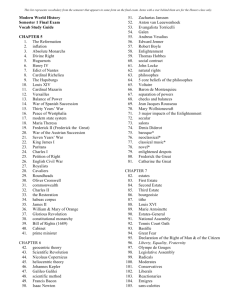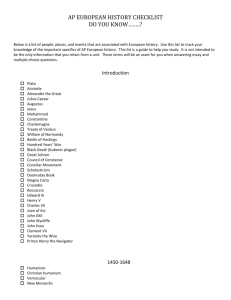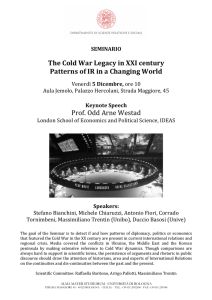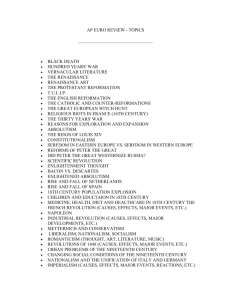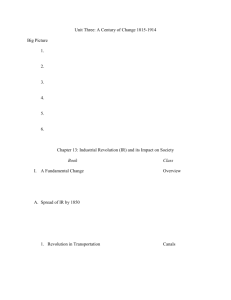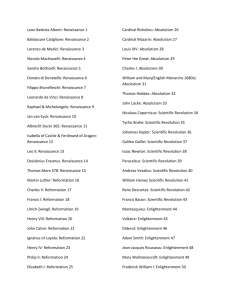World History II sol outline
advertisement
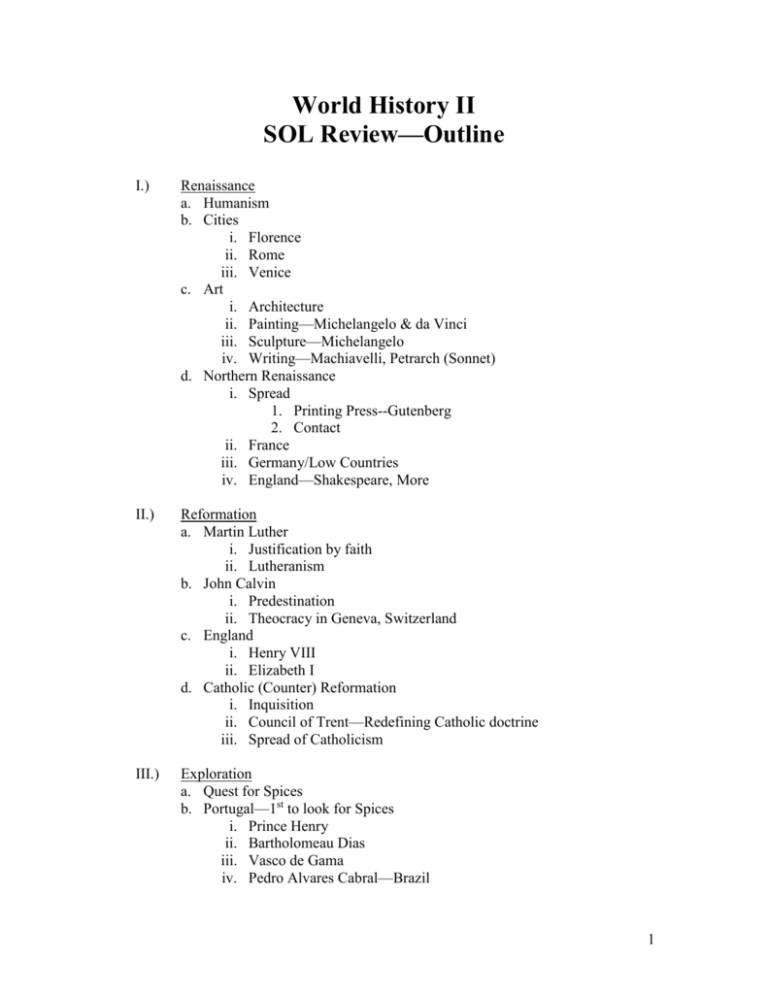
World History II SOL Review—Outline I.) Renaissance a. Humanism b. Cities i. Florence ii. Rome iii. Venice c. Art i. Architecture ii. Painting—Michelangelo & da Vinci iii. Sculpture—Michelangelo iv. Writing—Machiavelli, Petrarch (Sonnet) d. Northern Renaissance i. Spread 1. Printing Press--Gutenberg 2. Contact ii. France iii. Germany/Low Countries iv. England—Shakespeare, More II.) Reformation a. Martin Luther i. Justification by faith ii. Lutheranism b. John Calvin i. Predestination ii. Theocracy in Geneva, Switzerland c. England i. Henry VIII ii. Elizabeth I d. Catholic (Counter) Reformation i. Inquisition ii. Council of Trent—Redefining Catholic doctrine iii. Spread of Catholicism III.) Exploration a. Quest for Spices b. Portugal—1st to look for Spices i. Prince Henry ii. Bartholomeau Dias iii. Vasco de Gama iv. Pedro Alvares Cabral—Brazil 1 c. d. e. f. g. h. IV.) v. Trade in Africa Spain—Colonize the New World i. Christopher Columbus ii. Treaty of Tordesillas iii. Ferdinand Magellan iv. Hernan Cortes v. Francisco Pizzaro vi. Hernando de Soto vii. Francisco Vasquez de Coronado viii. Disease kills natives Netherlands i. Henry Hudson—Canada and US ii. South Africa France i. Jacques Cartier ii. Canada England i. Sir Francis Drake ii. John Cabot iii. Jamestown Slavery i. Cheap labor supply ii. Slave trade=major part of European economy iii. Middle Passage Commercial Revolution i. Joint-stock companies ii. Mercantilism iii. New foods and products in Europe Developing Nations a. Spain i. Absolutism ii. Habsburgs 1. Philip II 2. Charles II iii. War of Spanish Succession—Philip V (French) b. England i. Henry VII ii. Henry VIII iii. Mary—“Bloody Mary” iv. Elizabeth I 1. foreign policy 2. end of dynasty c. France i. Henry IV—Edict of Nantes ii. Louis XIII & Cardinal Richelieu 2 1. creation of absolute monarch 2. taking power from Protestants and Nobles iii. Louis XIV—“Sun King” 1. Absolutism 2. Versailles 3. War of Spanish Succession—French Expansion d. Holy Roman Empire—German States i. 30 Years’ War ii. Austria—Maria Theresa iii. Prussia—Frederick II iv. War of Austrian Succession v. Seven Years’ War/French and Indian War e. Russia i. Ivan IV ii. Peter the Great—Westernize Russia iii. Catherine the Great—Warm water seaport for Russian on the Black Sea V.) Muslim Empires a. Ottomans i. Take over of Byzantine empire (1453) ii. Suleiman I iii. Slow decline b. Safavid Persia i. Shiites ii. Ismail iii. Shah Abbas c. Mogul Empire i. Muslim control of Northern India ii. Babur iii. Battle of Panipat iv. Akbar v. Shah Jahan—Taj Mahal vi. Sikhism—blend of Hinduism and Islam VI.) Asian Empires a. China i. Ming Dynasty 1. Zhu Yuanzhang (Hong Wu) 2. Yong Le and Zheng He 3. Forbidden City ii. Qing Dynasty 1. Manchurian—NOT Chinese 2. Queue—braid 3. Taiping Rebellion 3 b. Japan i. Tokugawa Shogunate 1. Oda Nobunaga 2. Toyotomi Hideyoshi 3. Tokugawa Ieyasu a. Edo b. Sankin-kotai ii. Western Contact 1. Portuguese 2. Francis Xavier and Christianity 3. Act of Seclusion VII.) Scientific Revolution & Enlightenment a. Nicolaus Copernicus—Heliocentric Universe b. Johannes Kepler—planets have elliptical orbits c. Galileo Galilei--telescope d. Francis Bacon—use scientific method e. Rene Descartes—truth through reason f. Sir Isaac Newton—Universal Gravitation g. William Harvey—Blood Circulation h. Robert Hooke—cell i. Robert Boyle—chemistry j. Joseph Priestly—oxygen k. Thomas Hobbes i. People are naturally violent and disorderly ii. Absolute monarchy iii. People could not rebel l. John Locke i. People are naturally moral and reasonable ii. Contract between government and people iii. People could rebel if rights of life, liberty, and property were taken away m. William Penn—Quakers n. Montesquieu—3 Branches of Government o. Voltaire—separation of church and state p. Jean Jacques Rousseau—social contract between gov. and people q. John Wesley--Methodism VIII.) English Civil War a. James I b. Charles I c. Petition of Right d. Dissolution of Parliament e. William Laud f. Puritans g. Great Migration 4 h. i. j. k. l. m. n. o. p. q. Short and Long Parliament Cavaliers v. Roundheads Oliver Cromwell—Lord Protector Charles II—“Merry Monarch” Whigs and Tories James II William and Mary—Glorious Revolution Sir Robert Walpole George II George III IX.) American Revolution a. Great Britain’s view of its colonies b. Navigation Acts c. Colonial breakdown i. New England ii. Middle iii. Southern d. Impact of French and Indian War e. George Grenville f. Colonial protests i. Stamp Act Congress/Declaratory Act ii. Boston Massacre iii. Boston Tea Party/Intolerable Acts iv. First Continental Congress g. Lexington h. Olive Branch Petition i. George Washington j. Thomas Paine—Common Sense k. Thomas Jefferson—Declaration of Independence l. War i. British Strengths ii. Colonial Strengths iii. French Involvement iv. m. New Government i. Articles of Confederation ii. Constitution iii. Bill of Rights X.) French Revolution a. Pre-War France i. Estates—1st, 2nd, 3rd ii. Louis XVI iii. Estates General and Votes b. National Assembly 5 c. d. e. f. g. h. i. j. k. l. Fall of the Bastille Great Fear Nobles relinquish power Declaration of the Rights of Man and of the Citizen Civil Constitution of the Clergy Constitution of 1791 Arrest of Louis XVI & execution Spread to the rest of Europe Reign of Terror Napoleon i. Rise ii. Empire iii. 1st defeat iv. 2nd defeat m. Congress of Vienna i. Metternich ii. Alliances—Quadruple and Holy iii. Creation of German Confederation iv. Challenges to Metternich XI.) Industrial Revolution a. Pre-Industrial Europe i. 75% of people lived on farms ii. Lands were shared iii. Early industries in cloth, iron, glass iv. Domestic System b. Great Britain starts Industrial Revolution i. Enclosure movement—provides labor ii. Capital and resources available for industry iii. Urbanization c. New inventions/machines d. Growth of Business—Business cycle e. Rise of Middle class f. Rise of Working class g. Deplorable working conditions XII.) New Economic Ideas a. Laissez-faire economics b. Adam Smith—Wealth of Nations c. Thomas Malthus—poverty/population d. Legislation to regulate industry e. Karl Marx—Communist Manifesto & Das Capital f. Urbanization and Immigration g. Education reform h. Scientific Advancements i. Gregor Mendel—Genetics 6 ii. iii. iv. v. vi. vii. Charles Darwin—evolution Louis Pasteur—germs Joseph Lister John Dalton—atomic theory Ivan Pavlov Sigmund Freud XIII.) Reform in Western Europe & US a. Great Britain i. Peaceful reform ii. William Gladstone iii. Benjamin Disraeli iv. Creation of Dominions b. France i. Charles X ii. Louis Philippe iii. Revolution of 1848 iv. Louis Napoleon (Napoleon III) c. United States i. Expansion of territory 1. Louisiana Purchase 2. Florida 3. Mexican Cession ii. Extension of slavery iii. Civil War XIV.) Unification of Italy a. Risorgimento b. Giuseppe Mazzini i. War with Austria—Lombardy and Venetia ii. Withdrawal of the Pope iii. Invasion of Rome and creation of Republic c. Count Camillo di Cavour i. Alliance with France (Napoleon III) ii. War with Austria d. Giuseppe Garibaldi e. Development of a new nation XV.) Unification of Germany a. Early attempts b. Austria v. Prussia in German Conf. i. Junkers ii. Zollverein c. Bismarck—realpolitik d. Three Wars i. Danish 7 e. f. g. h. ii. Seven Weeks’ War iii. Franco-Prussian War Creation of an empire Kulturkampf Problems with socialists Fall of Bismarck XVI.) Rise of Austria-Hungary a. Revolution of 1848 b. Dual Monarchy—Austria-Hungary c. Balkans—“Powder Keg” XVII.) Russia a. Autocracy b. Alexander I—Decembrist Revolt c. Nicholas I d. Alexander II—attempts to modernize Russia by freeing serfs e. Alexander III i. Russification ii. Pogroms f. Nicholas II i. Mensheviks ii. Bolsheviks iii. Duma g. Revolution i. Murder of the Czar ii. Civil War iii. Rise of Lenin XVIII.) World War I a. Underlying causes i. Militarism ii. Imperialism iii. Nationalism iv. Alliances b. Assassination of Franz Ferdinand c. Escalation to war d. Schlieffen Plan e. Stalemate—Trench Warfare f. New technology i. Subs ii. Planes iii. Weapons—gas, tanks, etc. g. Effect of the US on the War h. European Peace i. 14 Points 8 ii. Versailles Treaty iii. Resentment XIX.) Inter-War Years a. Technology i. Automobile ii. Radio b. New Ideas i. Physics—Einstein ii. Psychology iii. Arts 1. Literature—despair in Life 2. Painting—abstract ideas a. Picasso—Cubism b. Surrealism—Dali 3. Music—Jazz c. Flapper d. United States i. Isolationist ii. Economic Book iii. Depression iv. FDR and the New Deal e. Great Britain i. Debtor Nation ii. Loss of world trade iii. General strike iv. Rise of the Labour Party f. France i. Lots of losses ii. Trouble economy iii. Troubled economics iv. Popular Front v. Maginot Line g. Italy i. Mussolini—Fascism ii. Prevented a communist revolution iii. Totalitarian government h. Germany i. Unhappy with dictated peace ii. Weimar Republic iii. Rise or Nazi Party iv. Hitler i. Russia i. Creation of a communist state by Vladimir Lenin ii. Transfer of power to Joseph Stalin iii. Five Year Plans 9 iv. Stalin’s rule XX.) World War II a. Japan’s desire for a Pacific Empire b. Mussolini flexing muscle in Ethiopia c. Tri-Partite Pact—Germany, Japan, Italy d. Non-Aggression Pact e. Appeasement f. Invasion of Poland and start of WWII (Sept. 1939) g. Fall of France h. Battle of Britain i. Pearl Harbor and US involvement j. Invasion of USSR k. Battle in Africa i. Rommell v. Montgomery ii. Invasion of Italy l. European Theater i. D-Day ii. Yalta iii. Holocaust iv. Victory in Europe m. Pacific Theater i. Island hoping ii. Atomic Bomb iii. Victory in Japan XXI.) Cold War a. Soviet take over of Eastern Europe—“Iron Curtain” b. Fear of Communism in the US c. Containment i. Truman Doctrine ii. Marshall Plan iii. Berlin Crisis—Berlin Airlift iv. NATO/Warsaw Pact v. Berlin Wall d. Communism in Latin America i. Cuba 1. Fidel Castro 2. Bay of Pigs Invasion 3. Cuban Missile Crisis ii. Nicaragua—Sadanistas v. Contras e. Communism in Asia i. China 1. Mao Zedong v. Chiang Kai Shek 2. fall to communism 3. Nixon—Détente 10 f. g. h. i. ii. Korea 1. North invades South—38th Parallel 2. UN action against North Korea 3. no changes iii. Vietnam 1. desire for independence from France 2. Fear of “Domino Theory” 3. Gulf of Tonkin Resolution—LBJ 4. Nixon—“Vietnamization” 5. Cold War thaw i. Nuclear Test ban treaty ii. Détente iii. SALT Middle East i. Creation of Israel ii. Egypt/Israel conflict—Camp David Accords iii. OPEC iv. Lebanon—PLO v. Iran vi. Persian Gulf War Fall of Communism i. USSR overspending on arms race and war in Afghanistan ii. Fall of Berlin wall iii. Eastern European nations gain freedom South Africa XXII.) Modern Problems a. Unity of world i. Technology bring world together ii. Economic competition leading to lower prices iii. More products b. Disunity of world i. Terrorism ii. Nuclear proliferation 11
